- Home
- James A. West
Reaper Of Sorrows (Book 1) Page 2
Reaper Of Sorrows (Book 1) Read online
Page 2
Rathe knew he should bury his dissatisfaction, but could not. He was a soldier, a skilled man of war, yet in the hands of the king to whom he swore fealty, he had become a murderer’s savaging sword. Of late, nothing he had done brought him honor, nor could those atrocities please Ahnok, the god he served.
In the last year, King Tazzim of Cerrikoth had ordered Rathe and the Ghosts to avoid battling Qairennor patrols, and instead to lead the company against undefended villages throughout the enemy’s realm. The king intended to break the faith the Qairennor lowborn had in Queen Shukura, rumored to be a witch with eyes set upon Cerrikoth.
Thus far, Rathe’s bold assaults had caught every settlement unawares, but he had yet to discover any evidence that Queen Shukura was a practitioner of dark arts, or had any designs for invading Cerrikoth. As for breaking anyone’s will, this morning had proven once more that Queen Shukura’s people stood firm in their fealty, and were willing to fight and die under the Rose of Qairennor banner.
From far off, the whistling crack of a scourge evoked a man’s scream. The note of pain echoed down streets empty of all but blowing dust and corpses fresh enough to leak blood. Where the sounds of agony made Rathe’s insides roil, they disturbed his men no more than the sprawled dead. Why should it bother them, or me, to conquer sworn enemies?
His thin resolve failed when he glanced around at a scene that had become as common to him as his reflection. Smoke rose from the village’s charred shops and homes. A gentle wind tugged apart the sooty plumes, dragging the remnants east across a rolling grassland toward the Mountains of Arakas. That boundary between the kingdoms of Qairennor and Cerrikoth rose to peaks high, jagged, and crowned in snow through every season.
Farther down the village’s main street, a pack of wild dogs converged on a small, half-burned corpse, snapping and growling to see which would have the first bite. Rathe’s teeth ground together as the dead boy’s thin limbs thrashed lifelessly. Other boys, girls, men, and women awaited the curs’ jaws and ripping teeth. As well, vultures circled above, black scribbles on a cerulean canvas, patient for their turn at the butchers’ leavings.
Yes, it was all too familiar, and he’d had his fill of it…. But he was a soldier of Cerrikoth, the king’s champion, the most esteemed Cerrikothian warrior in five generations. How could he balk at his liege’s will? And how can I not? he considered, as the scourge’s unseen leather tongues snapped again.
Rathe lifted his face to the breeze. It favored him by bringing on its foul breath a pleading chorus from the other captives. The questioning had begun three hours past dawn. It would continue until some wretch disclosed the information Rathe sought at the behest of King Tazzim. What offerings does the witch-queen demand? Is there gold within the village? Have you seen Qairennor patrols riding east … supply caravans?
The prisoners would speak eventually, they always did, but what they revealed was common knowledge, and nothing of value. A few trinkets would be found, a healer’s cupboard of potions, foodstuffs meant to hold the villagers through lean seasons, maybe even a few odd swords and spears held over from campaigns of old—heirlooms and necessities, nothing more. Yet that bric-a-brac would serve as evidence of Queen Shukura’s treachery … at least in the eyes of King Tazzim. Afterward, Rathe would command the villager’s executions, as he had so often in the last year.
How many dead at my order? Hundreds, without question, and that blood stained his soul more than that of the soldiers he had slain in honest combat during the border wars between Cerrikoth and the kingdoms of Unylle and Trem.
When another scream soared over the village, Thushar said, “The banner of our glorious god stiffens their tongues.” He used wet sand to scrub away stubborn bloodstains from his hands.
As if livened by praise, the company’s crimson banner bearing the golden face of Ahnok, the Cerrikothian god of war, lifted and flapped. Rathe looked askance at the head of that snarling lion, with its mane of fanged serpents. At one time, he would have killed the one who let even a corner of that banner touch the soil men tread upon. Now … well, now, things had changed. His greatest regret was that his actions had sullied his god’s likeness and name.
“It’s wise that they fear our device,” Rathe agreed in a somber tone. He hesitated, the proud words he must speak as the leader of the Ghosts bitter on his tongue. “A hundred years of victory are bound up with the standard of the Ghosts of Ahnok. When seen, the hearts of our strongest enemies quail.” In a smaller voice, he added, “More’s the pity that fear now breeds hatred, giving rabble the strength to resist at the price of their lives.”
Thushar gave a mystified snort. “Why should you care? Your people have been fighting these scum a generation.”
“Before that,” Rathe answered, “these enemies were our allies, and we fought against your forefathers.”
Indifferent about a point that still brought anger to many of those of the eastern kingdom of Pryth, Thushar shrugged his thick shoulders. “In Pryth we fight family against family—ofttimes brother against brother. If honor needs restoring, or vengeance taken, then blood wets steel and soil. To do less is the way of the craven. Were I you, I’d be happy to be rid of all Qairennorans, along with the witch who rules them.”
Fury boiled up inside Rathe. He stabbed a finger at the torn remains of the child the wild dogs had left behind. “Should I be happy for his death? He was but a boy! What did he do to me, or any of us, that we should cleave his spirit from his flesh? As to witches, have you seen sign of sorceries anywhere in Qairennor? Has lightning struck our ranks, have fireballs burned our brothers, have abominable words come on the wings of the night to still our hearts? I have not seen any of these things, have you?”
Sergeants Girod and Saros paused in cleaning themselves, and listened with heads cocked. The faces of Algios and Zalvid stiffened.
Thushar, Rathe’s dearest friend, shook his head, baffled. “In ten years, that boy would have fathered sons to raise swords against the sons you and I will one day sire. It matters naught if Queen Shukura is a witch. King Tazzim has declared Qairennor and its queen the enemies of Cerrikoth, and he pays good coin to destroy his foes, and grants the right of pillage against the vanquished.”
Rathe stared back, wondering if his doubts were treacherous weakness, or if simple exhaustion had sapped the fire and lust for battle from his spirit? It seemed possible, for fatigue was the destroyer of courage. Possible, but doubtful. Making war against farmers was abhorrent … yet, he had waged that war, and could not condemn the men under his command any easier than he could accuse King Tazzim, not without judging himself. Trapped between conscience and duty, he surrendered to the latter.
“Forgive me, brothers, I am simply weary in my bones,” he said. “It’s been a long expedition. More than anything, I yearn for shade, a flagon of sweet summer wine, and a woman with which to share both.” That last, at least, was true. The affections of women, he had found, erased the stains of furious, bloody battle from his soul.
Silence held as the words expected from the Scorpion, the Champion of Cerrikoth, the Captain of the Ghosts of Ahnok, sunk into the minds of his men.
“As you say!” Thushar boomed, his abrupt laughter loosening the tension as if it had never been. Looking more than a little relieved, the sergeants guffawed and whooped, then began a lively debate about the qualities of various slatterns they had encountered in Cerrikoth’s most sordid districts.
Rathe breathed easier. There were men he trusted and men he did not, but the Ghosts of Ahnok were brothers bound by blood and steel, and all the more dangerous for it. While the king’s law held sway, often a harder law governed the Ghosts. He held his position by strength and skill, cunning and victory—a custom as old as the first warrior-gods themselves. If the leader of the company showed weakness, he faced not banishment but death.
Sensing that his standing was still firm, even if his heart remained uncertain, Rathe poured a last pot of water over his chest and back, a lithe collection of
corded muscle and sinew under smooth dark skin, then stepped away from the shaded wellspring to let the warm summer sunlight dry him. Afterward, he donned his undergarments, supple leather trousers, and a linen tunic under a shirt of black chainmail. He knelt to tug on his riding boots.
“We should find some of that wine you spoke of,” Thushar suggested. “Even goatherds must appreciate revelry.”
After he snugged into a black-scaled tabard, the big Prythian strapped Rathe into a breastplate of boiled leather, its chest emblazoned with a golden image of Ahnok. As they made ready, the crack of the scourge and the subsequent howl of pain floated over the conquered village.
“If ever there was a time to get good and drunk,” Rathe said, struggling to sound enthusiastic, “it’s now.”
“We should also feast the men after sundown,” Thushar hinted. “As you said, it has been a long, wearying expedition.”
“Just so,” Rathe agreed, buckling his sword belt. Already, sweat coated his ribs and chest, but as with the weight of the breastplate, it felt right to him. Despite his discontent with the king’s standing orders—and, more, his part in carrying out those commands—arms and armor made him feel whole, his purpose true. He did not crave the death and bloodshed that came with war, but when those things found him, he prevailed.
The last thing he retrieved was his bronze helmet fashioned into the head of Ahnok. A layer of dust dulled its gleam, and a smear of blood festooned one side. The woman who had left that maroon print had tried to take off his head with a cleaver, bare heartbeats after he had cut down the man he supposed was her husband. Rathe left the blood as a reminder to himself and his men that this day he had taken lives, innocent or not, the same as them.
Turning back to his sergeants, he commanded with forced joviality, “When you are finished primping, gather men to help in the search. If the queen or her lords have hidden anything hereabouts of worth or threat to Cerrikoth, I want it found before nightfall. We leave on the morrow.”
Nods of agreement met his orders, but quizzical expressions seemed to ponder the necessity of haste. Ofttimes, the company would spend a day looting the choicest plunder, before venturing off on another mission.
To that unvoiced question, Rathe said, “This place reeks of the blood of cowards.” The village did not reek of cowards, only blood. A thought occurred to him then, an answer to his troubles. “To keep our skill and honor, we will seek out worthy foes—Qairennor patrols have been denied us too long.” And in so doing, I will discover if the fight has fled from my heart, or if I have only grown weary of mindless, disgraceful slaughter.
The questioning looks vanished, and the sergeants cheered the coming challenge. They would follow the king’s orders to sack helpless villages, but a side mission to test their might and courage against a formidable enemy would serve as a welcome test.
If I have my way, Rathe thought, there will be no more villages. Going against the king might mean his head on a spike, but he would sleep easier between now and the day the headsman’s axe fell.
Chapter 3
Rathe led Thushar toward the village green and the torturer performing his bloody work before an audience of threescore prisoners. Thushar held silent until they turned down a shadowed alley. One huge hand fell on Rathe’s shoulder. “As a friend,” Thushar began, “I offer you a word of advice.”
Rathe shot him a curious look. “As you will.”
“Each of us have our dislikes,” Thushar went on mildly, “things we loathe. Me, it’s razing a town, even if filled with enemies. There can be no greater waste.”
Rathe gazed deep into his friend’s eyes, silently demanding answers he would never receive. What of the women who plead for the lives of their children, before the falling blade silences them? What of the boys who have yet to fill their hands with the hilt of a sword, or to draw an arrow and fire it in anger—do you dislike wasting their lives as much as burning a village?
Aloud, Rathe said, “I have no stomach for slaying lowborn armed with shepherds’ crooks and crofters’ hoes. I long to fight warriors that test my strength and wits. Such battles make men of boys, and heroes of men.”
“Just so,” Thushar said. “But we have sworn the oaths of allegiance to King Tazzim. To betray that loyalty is to betray the god we serve. As such, I keep my mouth shut about what I dislike—as should we all, until our time of soldiering has passed, or until we have been called home to sit at the feet of Ahnok.”
“Should we hold our tongues even when dishonored by orders to raid and pillage, like a band of godless plainsmen?”
“You command the Ghosts of Ahnok,” Thushar said. “You know the answer to that question, better than most. If you have forgotten, brother, then the answer you seek is yes. We do as the king commands. If we do not, who can blame the loyal warrior for turning on his treacherous commander?”
Rathe understood that warning well enough, and thought to mollify his friend. His war of conscience was his to bear, not Thushar’s, and he had already made his decision to fight warriors, not villagers. “As I said earlier, I am weary in my bones. It’s long past our time to be relieved.”
“I agree, brother, but promise you will be more careful.”
“Is there a reason I should, beyond your liking of my head’s current placement upon my neck,” Rathe asked, smiling.
Thushar did not rise to the jest. Instead, he pitched his voice low. “Girod. He is bastard-born, true, but carries in his veins the blood of nobility. If there is gain in it, he will not hesitate to report anyone he imagines is a traitor—even you, Scorpion.”
Rathe offered a sober nod. “I promise, Thushar, to be more careful. Like you, I mistrust him. He looks and acts the dullard, but his eyes are too knowing by far. Still, I cannot believe he is anything besides a nuisance foisted upon the Ghosts by his father, Lord Osaant.”
At another drawn-out scream, they resumed their approach to the green. Unpleasant as Rathe found his current mission, it must be finished, as all his former missions over the last twelve years had been.
Twelve years…. A finger of melancholy touched him as he envisaged the boy he had been when the wizened Captain Nariq had placed a spear into his hands … hands that had never held anything more dangerous than a hoe in the ten years after his birth. After a year of training to become a legionnaire, blood, strife and death had come to define him and his purpose. Without hesitation, with unmatched skill, he had performed countless deeds, both heroic and heinous. As reward, he had risen quickly through the ranks. To the minds of some, he had heard whispered, his rise had been too quick.
Twelve years, barely a third of the time he needed to serve in the king’s army before rising to commander, the highest rank a Cerrikothian commoner could hope to gain. Gain it he would, and far younger than most. Perhaps then he would have influence enough to gain King Tazzim’s ear, and turn him to battles worth fighting. It was a hope—thin, perhaps, but a hope all the same.
Before they reached the village green, Thushar covered his nose to block the cloying reek of blood and spilled innards. “By all the gods, it’s always worse when the sun is high.”
Flies swarmed as they stepped from shadow into stark daylight. Rathe steeled himself for what waited, but it was no use. His gorge rose at the sight of what he himself had ordered done. He had seen it all before, in one village or another, but this day the sight left him reeling.
At every sacked village, Rathe commanded the planting of a rough-hewn, ten-foot cedar pole within sight of the captured villagers. After a year, bloodstains gone to black streaked the pole’s length. By the pile off to one side, he judged that three men had died hanging by their wrists, their ruined flesh giving up every drop of life’s blood to the close-cropped grass under their dangling feet. The flyblown corpses looked like shredded bags of meat.
Kneeling shamed and naked, hands bound at the small of their backs, the villagers watched the tortures from one side of the green. A handful of laughing soldiers guarded them, untouche
d by the brutality.
“This is close enough,” Rathe said, barely keeping iron in his voice. He told himself again that this barbarity must be done for the Kingdom of Cerrikoth and King Tazzim. As a Ghost of Ahnok, it was his duty.
“After a proper bath, I would hate to get all bloody again,” Thushar muttered, misunderstanding Rathe’s order.
Legionnaire Pellos, another Prythian giant, had stripped to the waist to better swing his scourge. Unlike Thushar, Pellos kept to the grooming traditions of his homelands, choosing to wear his black beard fashioned into a pair of thick braids held taut by heavy brass rings. Fresh spatters of crimson covered him from toe to crown, overlaying drops of dried blood that had flown from the torn flesh his previous victims.
“Tell me, little man,” Pellos urged with sinister kindness, “where does your queen keep her gold. Tell me … and all this can end. I will even hold off my brothers from ravishing your womenfolk. Wouldn’t that be fine?”
The villager eyed his family and friends, then looked back to the massive Prythian. His lips peeled back in a terrible grin, and dried blood cracked and fell off in flakes. A disturbing chortle spilled from his throat. “Gods curse your snake’s heart!”
“Hmm,” Pellos rumbled, lifting the waterskin hanging from his studded leather sword belt. He poured a few swallows into his open mouth, swished it around, and spat it on the prisoner. The man laughed and wept in the same breath. Pellos silenced him with a blinding fist to the ribs. Rathe grimaced at the crack of breaking bones, a sound akin to green saplings snapped over a knee. I should halt this farce, he told himself, but his wavering sense of duty held him fast.
Pellos took another long drink, letting half the water spill over his broad, hairy chest. Rivulets of pink-stained water pattered around his boots. With a satisfied smacking of his lips, he thumbed the cork back into the waterskin and dropped it to dangle from its strap. The prisoner watched the waterskin swing, and missed the sidearm stroke that slashed the scourge across his face. Leather tongues embedded with sharp metal teeth tore the man’s cheek, nose, and one eye to ribbons. A thin whimper squeezed past his gritted teeth, but he did not cry out.

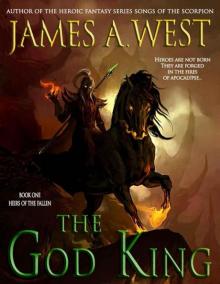 The God King hotf-1
The God King hotf-1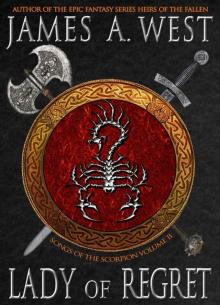 Lady Of Regret (Book 2)
Lady Of Regret (Book 2)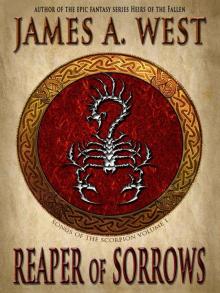 Reaper Of Sorrows (Book 1)
Reaper Of Sorrows (Book 1)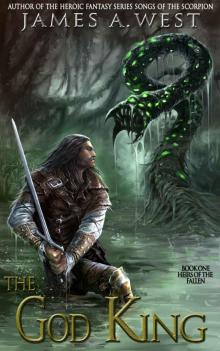 The God King (Book 1) (Heirs of the Fallen)
The God King (Book 1) (Heirs of the Fallen)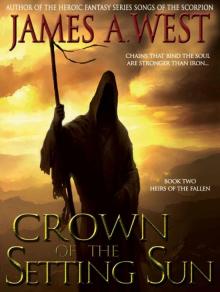 Heirs of the Fallen: Book 02 - Crown of the Setting Sun
Heirs of the Fallen: Book 02 - Crown of the Setting Sun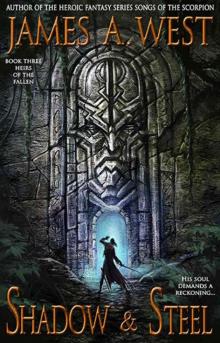 Heirs of the Fallen: Book 03 - Shadow and Steel
Heirs of the Fallen: Book 03 - Shadow and Steel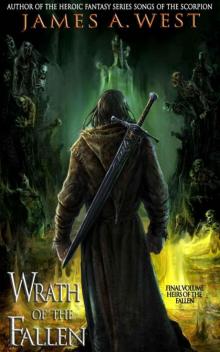 Heirs of the Fallen: Book 04 - Wrath of the Fallen
Heirs of the Fallen: Book 04 - Wrath of the Fallen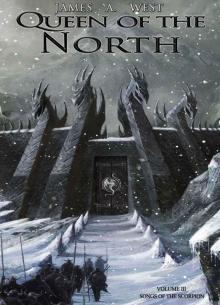 Queen of the North (Book 3) (Songs of the Scorpion)
Queen of the North (Book 3) (Songs of the Scorpion)